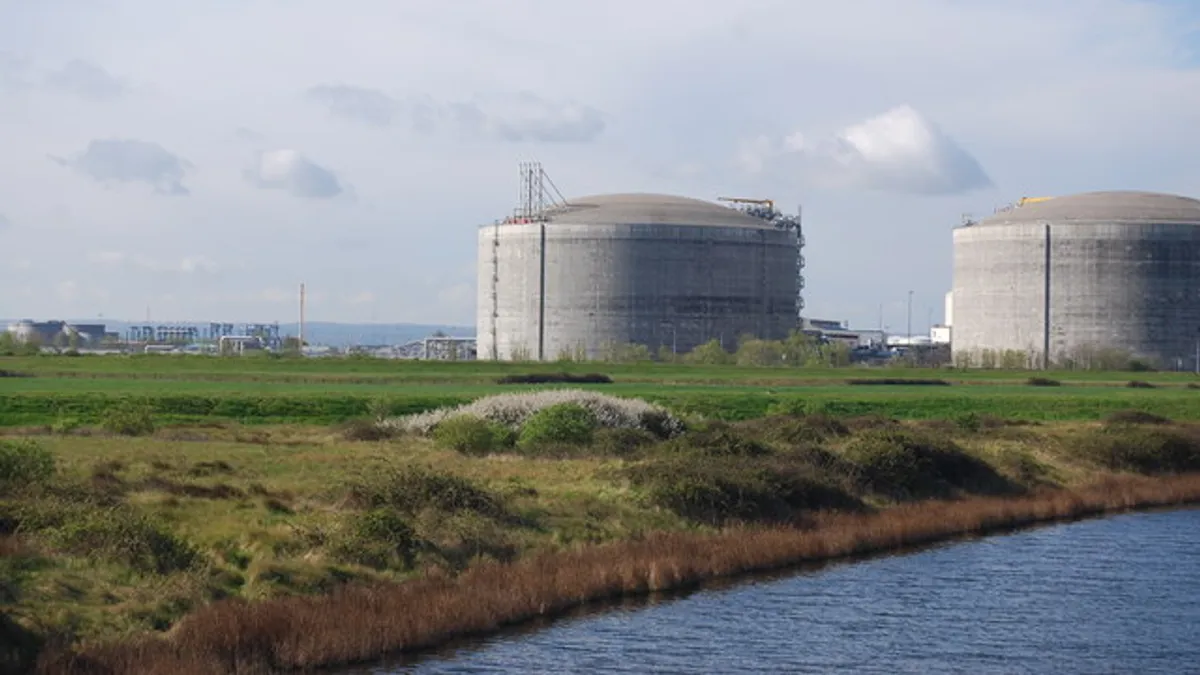UPDATE: Nov. 19, 2019: New York Gov. Andrew Cuomo's threat to revoke National Grid's operational certificate is credit negative for all investor-owned utilities in the state, Moody's Investors Service said Nov. 18.
Moody's analysts aren't certain of the process by which New York could cancel National Grid's certificate and think it's unlikely that the state will actually do so. However, Cuomo's letter weakens the consistency and predictability of utility regulation in New York, they said.
Dive Brief:
-
New York Governor Andrew Cuomo, D, on Tuesday notified National Grid executives of his intention to revoke the company’s authority to operate its gas franchise in New York City and Long Island, for failing to provide customers with reliable service.
-
National Grid announced a moratorium on new natural gas applications hookups in May, citing the need for additional capacity in its downstate territory. Cuomo criticized the company's support for a proposed $1 billion gas pipeline and failure to look into alternative options like trucking gas, writing that the utility was either grossly negligent or deliberately defrauded customers.
- If the utility's certificate is revoked, the company will lose the authority to serve 1.8 million gas customers in downstate New York, where it has a total rate base of $6.34 billion for its gas business. National Grid's CEO John Pettigrew and President John Bruckner have 14 days to respond to Cuomo's notice.
Dive Insight:
Cuomo’s threat to revoke National Grid’s certificate of public convenience and necessity could deal a death blow to its gas business in New York. The company has 12,000 miles of gas pipelines in the region and recorded $3 billion in planned gas investments between 2017 and 2019. As of March 31, 2019, the collective rate-base of its gas business in New York and Long Island amounted to $6.34 billion, according to its 2018-19 annual report.
National Grid’s Northeast Supply Enhancement (NESE) pipeline proposal would install nearly 24 miles of underwater pipeline to transport natural gas to New York. The company said that it needs the additional gas capacity to meet increased demand in downstate New York, in an August statement. The New York State Department of Environmental Conservation, however, denied a required permit for the project in May due to concerns that it would affect water quality standards, leading the company to place a moratorium on new service applications.
In his letter, Cuomo said the company should have explored alternatives to the pipeline before adopting the moratorium, like trucking or shipping the gas, implementing demand response measures and proposing renewable sources of energy. The moratorium is either “a fabricated device” or reflects incompetence, he said.
“The choice was never between the pipeline or an immediate moratorium. There were, and are, certainly other short-term solutions. That was your legal obligation,” Cuomo wrote.
The utility had previous plans to transport natural gas via truck to New York, according to S&P Global Platts.
Cuomo also criticized National Grid for basing future supply on a “single, speculative project” — the NESE — that is conditioned on approval from multiple jurisdictions, saying that the decision was irresponsible. National Grid’s actions violate New York’s utility mandate, the letter said, prompting Cuomo to revoke the company’s operational certificate.
National Grid received Cuomo's letter and will respond within the required time period, the company told Utility Dive in an email.
“We continue to work with all parties on these critical natural gas supply issues on behalf of all our customers in downstate New York,” National Grid said.
Gas advocates were skeptical of Cuomo’s suggestion that National Grid look into trucking natural gas to downstate New York. According to the American Gas Association (AGA), transporting natural gas in trucks is a temporary and expensive option that is used only when pipelines are being serviced.
The “punitive measures” against National Grid would further affect communities in New York that need affordable and reliable energy, AGA President and CEO Karen Harbert said in an emailed statement.
“By vetoing pipelines and denying access to natural gas, Governor Cuomo is forcing families to use more expensive and dirtier fuels to heat their homes,” she said.
Alternative modes of delivery could meet short-term gas needs, but pipelines remain the safest, most reliable and most efficient way to deliver natural gas, a spokesperson for the Interstate Natural Gas Association of America (INGAA) told Utility Dive via email.
But Rich Schrader, New York political director with the Natural Resources Defense Council, said National Grid’s proposed pipeline would be incompatible with New York’s target of reducing economy-wide emissions by 85% from 1990 levels by 2050, adopted as part of a sweeping climate bill passed in June. The bill also includes incentives for renewable heating, Schrader said. Possible solutions for downstate New York could include energy efficiency measures, investments in green heating technologies and advancements in the heat pump industry.
“Can it be done in a year? Of course not — but this pipeline won’t be done in a year either,” Schrader said.
Before National Grid’s operational certificate for its gas service can be revoked, the New York State Department of Public Service would need to hold hearings to determine whether the company failed to provide safe and reliable energy to its customers.















